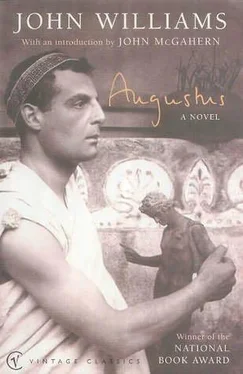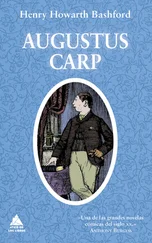John Williams - Augustus
Здесь есть возможность читать онлайн «John Williams - Augustus» весь текст электронной книги совершенно бесплатно (целиком полную версию без сокращений). В некоторых случаях можно слушать аудио, скачать через торрент в формате fb2 и присутствует краткое содержание. Жанр: Историческая проза, на английском языке. Описание произведения, (предисловие) а так же отзывы посетителей доступны на портале библиотеки ЛибКат.
- Название:Augustus
- Автор:
- Жанр:
- Год:неизвестен
- ISBN:нет данных
- Рейтинг книги:3 / 5. Голосов: 1
-
Избранное:Добавить в избранное
- Отзывы:
-
Ваша оценка:
- 60
- 1
- 2
- 3
- 4
- 5
Augustus: краткое содержание, описание и аннотация
Предлагаем к чтению аннотацию, описание, краткое содержание или предисловие (зависит от того, что написал сам автор книги «Augustus»). Если вы не нашли необходимую информацию о книге — напишите в комментариях, мы постараемся отыскать её.
Augustus — читать онлайн бесплатно полную книгу (весь текст) целиком
Ниже представлен текст книги, разбитый по страницам. Система сохранения места последней прочитанной страницы, позволяет с удобством читать онлайн бесплатно книгу «Augustus», без необходимости каждый раз заново искать на чём Вы остановились. Поставьте закладку, и сможете в любой момент перейти на страницу, на которой закончили чтение.
Интервал:
Закладка:
This treatment is to be repeated four times; then the patient will be allowed to rest for two hours. This routine of treatment shall be continued until the patient's fever subsides.
VIII. The Journal of Julia, Pandateria (A.D. 4)
When my father returned home from Spain, I knew at once the reason for my marriage. He had not expected to survive even the journey to his family, so grave had been his illness in Spain; to insure my future, he gave me to Marcellus; and to insure the future of what he often called his "other daughter," he gave Rome to Marcus Agrippa. My marriage to Marcellus was largely a ritual affair; technically I became nonvirginal; but I was hardly touched by the union and I remained a girl, or nearly so. It was during the illness of my father that I became a woman, for I saw the inevitability of death and knew its smell and felt its presence.
I remember that I wept, knowing that my father would die, whom I had known only as a child; and I came to know that loss was the condition of our living. It is a knowledge that one cannot give to another.
Yet I tried to give it to Marcellus, since he was my husband and I had been taught my proper behavior. He looked at me in bewilderment, and then said that however unfortunate, Rome would endure the loss, since our Emperor had had the foresight to leave his affairs in order. I was angry then, for I felt that my husband was cold and I knew that he thought himself to be the heir to my father's power, and foresaw the day when he too would be an Emperor; now I know that if he were cold and ambitious, it was the only way he knew; it was the life to which he had been reared.
My father's recovery from the illness that should have led to his death was regarded by the world as a miracle emanating from his divinity, and thus in the normal order of things. When the physician Antonius Musa at last performed his desperate treatment, which in later years came to bear his name, the arrangements for my father's funeral were already being made. Yet he survived the treatment, and slowly began to recover, so that by late summer he had regained some of his weight and was able to stroll for a few minutes each day in the garden behind our house. Marcus Agrippa returned the seal of the Sphinx that had been entrusted to him, and the Senate decreed a week of thanksgiving and prayer in Rome, and the people in the countryside all over Italy erected images of him on the crossroads, in celebration of his health and to protect travelers on their journeys.
When it was clear that my father would regain his health, my husband, Marcellus, fell ill with the same fever. For two weeks the fever worsened, and at last the physician Antonius Musa prescribed the same treatment that had saved my father. In another week, in the midst of the rejoicing over the recovery of the Emperor, Marcellus was dead; and I was a widow in my seventeenth year.
IX. Letter: Publius Vergilius Maro to Quintus Homtius Flaccus (22
B.C.)
The sister of our friend Octavius still grieves for her son; time does not bring her that gradual diminution of pain, which is time's only gift; and I fear that my poor efforts to give her heart some solace may have had an effect I did not intend.
Last week, Octavius, knowing that I had been moved to compose a poem upon the death of his nephew, urged me to come again to Rome so that he might hear what I had done; and when I informed him that the poem I had written I intended to incorporate in that long work upon Aeneas, the completed parts of which he has rather extravagantly admired, he suggested that it might give some comfort to his sister to know that her son was so admired by the Roman people that he would live in their memories for so long as they had them. Thus he invited her to be present at the reading, informing her of the nature of the occasion.
Only a few were present at Octavius's house-Octavius himself, of course, and Livia; his daughter Julia (it is difficult to think of one so young and beautiful as a widow); Maecenas and Terentia; and Octavia, who came into the room as if she were a walking corpse, dreadfully pale, with deep shadows under her eyes. Yet she seemed composed, as always, and behaved with graciousness and consideration to those who could comfort her.
We talked quietly for a while, remembering Marcellus; once or twice, Octavia almost smiled, as if charmed by a pleasant memory of her son. And then Octavius asked me to read to them what I had written.
You know the poem and its place in my book; I shall not repeat it. But whatever faults the poem may have in its present state, it was a moving occasion; for a moment we saw Marcellus walking once more among the living, vital in the memories of his friends and his countrymen.
When I finished, there was a quietness in the room, and then a gentle murmuring. I looked at Octavia, hoping that I might see in her face, beyond the sadness, some comfort in the knowledge of our concern and pride. But I saw no comfort there. What I saw I cannot truly describe; her eyes blazed darkly, as if they burned deep in her skull, and her lips were drawn in the awful semblance of a grin that bared her teeth. It was a look, it seemed to me, almost of pure hatred. Then she gave a high toneless little scream, swayed sideways, and fell upon her couch in a dead faint.
We rushed to her; Octavius massaged her hands; she gradually revived, and the ladies took her away.
"I am sorry," I said at last. "If I had known-I only intended her some comfort."
"Do not reproach yourself, my friend," Octavius said quietly. "Perhaps you have given her a comfort, after all-one that none of us can see. We cannot know at last the effects of what we do, whether for good or ill."
I have returned to Naples; tomorrow I shall resume my labors. But I am troubled by what I have done, and I cannot but fear for the future happiness ofthat great lady who has given so much to her country.
X. Letter: Octavia to Octavius Caesar, from Velletri (22 B. c.)
My dear brother, I arrived, safe but weary, in Velletri yesterday afternoon, and have been resting since. Below my window is the garden where we used to play as children. It is somewhat overgrown now, or at least it seems so to me; most of the shrubs have succumbed to the winter weather, the beeches need pruning, and one of the old chestnut trees has died. Nevertheless, it is pleasant to gaze upon this spot and recall those days when we were free from the cares and sorrows of the world, so many years ago.
I write you upon two matters: first, to extend my long overdue apologies for my behavior on that awful night when our friend Vergil read to us of my late son; and second, to make a request.
When next you have occasion to write or speak to Vergil, will you explicitly ask his forgiveness for me? I did not intend my action, and I would be regretful if he took it as an unkindness. He is a good and gentle man, and I would not have him believe that I thought otherwise.
But it is the request that I make to you with which I am more concerned.
I wish to have your permission to retire from that world of affairs in which I have lived for as long as I can remember, so that I may spend the years that remain to me in the quiet and solitude of the country.
All my life I have done the duty required of me by my family and my country. I have performed this duty willingly, even when it went against the inclinations of my person.
In my childhood and early youth, under the tutelage of our mother, I performed the duties of the household with willing pleasure; and after her death, I more fully performed them for you. When it became necessary to our cause to conciliate the enemies of Julius Caesar, I gave myself in marriage to Gaius Claudius Marcellus, and upon his death I became wife to Marcus Antonius. To the best of my abilities, I was a good wife to Marcus, while remaining your sister and dutiful to our family. After Marcus Antonius divorced me and cast his fortunes in the East, I raised the children of his other marriages as if they were my own, indeed, even that Julius Antonius of whom you now are so fond; after his death, I took under my protection those children of his by Cleopatra that survived the war.
Читать дальшеИнтервал:
Закладка:
Похожие книги на «Augustus»
Представляем Вашему вниманию похожие книги на «Augustus» списком для выбора. Мы отобрали схожую по названию и смыслу литературу в надежде предоставить читателям больше вариантов отыскать новые, интересные, ещё непрочитанные произведения.
Обсуждение, отзывы о книге «Augustus» и просто собственные мнения читателей. Оставьте ваши комментарии, напишите, что Вы думаете о произведении, его смысле или главных героях. Укажите что конкретно понравилось, а что нет, и почему Вы так считаете.











